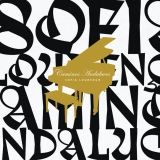Auf diesem Album der portugiesischen Pianistin Sofia Lourenço erklingt spanische Klaviermusik des 20. Jahrhunderts. Das Programm begintn mit Ernesto Halffter Danza de la gitana, die Teil ist des Balletts Sonatina. Sofia Lourenço spielt auf einem Faziola F 278 der etwas metallisch klingt aber andererseits auch klar und prägnant. Die Interpretation ist kraftvolle-tänzerisch, sehr farbig und viel genuiner als etwas die Interpretation von Alicia de Larocha, deren Spiel im Vergleich zu elegant wirkt.
Isaac Albéniz ‘ Evocation habe ich noch nie so kontrastreich und leidenschaftlich gehört wie in dieser Einspielung. Sehr farbig und vital erklingt auch El Puerto, tänzerisch akzentuiert und zupackend gespielt.
Nicht weniger persönlich und dramatisch geschärft geht die Pianistin an das ebenfalls aus Iberia stammende Stück El Albaicín heran.
In den Cuatro piezas españolas von Manuel de Falla hat man gute Vergleichsmöglichkeiten mit der Welte-Aufnahme des Komponisten. Der Vergleich zeigt, dass Sofia Lourenço sich von de Falla deutlich abgrenzt, sie reizt die Stücke rhythmisch viel differenzierter aus und ihr Spiel wirkt unmittelbarer und konturierter, mit klugem Rubato. Leicht irritierend wirkt dennoch der etwas scharfe Klang des Flügels.
Das Album verdient Beachtung wegen des sehr persönlichen und fantasievollen Spiels von Sofia Lourenço.
This album by Portuguese pianist Sofia Lourenço features Spanish piano music from the 20th century. The program begins with Ernesto Halffter’s Danza de la gitana, which is part of the ballet Sonatina. Sofia Lourenço plays a Faziola F 278, which has a slightly metallic sound, but is also clear and concise. The interpretation is powerful, dance-like, very colorful and much more authentic than something like Alicia de Larocha’s interpretation, whose playing is too elegant in comparison.
I have never heard Isaac Albéniz’s Evocation as rich in contrast and passionate as in this recording. El Puerto also sounds very colorful and vital, dancingly accented and grippingly played.
The pianist’s approach to El Albaicín, also from Iberia, is no less personal and dramatically sharpened.
In the Cuatro piezas españolas by Manuel de Falla, one has good opportunities for comparison with the Welte recording of the composer. The comparison shows that Sofia Lourenço clearly distinguishes herself from de Falla, playing the pieces in a much more rhythmically differentiated way, and her playing seems more direct and contoured, with a clever rubato. Nevertheless, the somewhat sharp sound of the grand piano is a bit irritating.
The album deserves attention for Sofia Lourenço’s very personal and imaginative playing.
























